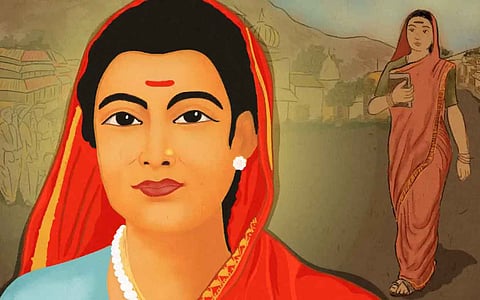
Dhol ganwar shudra pashu nari, yeh sab taran ke Adhikari
The aforementioned lines of Tulsidas which exhort to beat villagers and lower caste, capture the zeitgeist of the medieval ages when women were forbidden from going to schools and were subjected to horrific rituals such as Sati.
The centuries that followed were also dark, but the darkness gave way to social reforms. While Social reformers like Raja Rammohan Roy took up the cudgels on the behalf of the widows in Bengal. While some decades later in Maharashtra a couple was doing things which had wider ramifications and unnerved the conservative sections of the society.
Born on 3rd January 1831 in Satara, she was married at an early age to Jyotiba rai Phule Savitri Bai Phule managed to come out of the shadows of her husband Jyotiba Phule, a social reformer who dared to question the established beliefs entrenched in the society.
Savitri was illiterate at the time of her marriage. Jyotiba took the onus of educating her. Not only was she taught by Jyotiba Phule, but she also got trained by an American missionary at Ahmednagar, and before the age of 17 she was literate enough to teach others. But what she was about to do was to raise the heckles of the status quo-ist of the time- on 1st January 1848, just two days before her 17th birthday, she opened a School for girls, which was the first school for girls. But this revolutionary step was not without any reaction.
Savitri was subjected to immense opposition and attack (both verbal and physical) in fact, the conservative men threw stones and mud at her so much so that she always carried an extra saree with her. The couple was subjected to ostracism not only from the upper-caste orthodox men but also faced a boycott from their own family and in , and they moved out of their father’s house.
It was Usman Sheikh who came to their rescue and together with his sister Fatima Sheikh Savitribai opened two more schools and by 1851 the couple was providing education to 150 students in Pune in three different schools in an interview with a Christian missionary periodical in 1853 her husband Jyotiba Phule said, “It did occur to me that the improvement that comes about in a child due to the mother is very important and good. So those who are concerned with the happiness and welfare of this country should definitely pay attention to the condition of women and make every effort to impart knowledge to them if they want the country to progress. With this thought, I started school for girls first. But my caste brethren did not like that I was educating girls and my own father threw us out of the house.”
After setting up the schools the couple set for another project- the Native Female School, Pune and The Society for Promoting the Education of Mahars, Mangs and Etceteras. The trust had many schools under it.
In 1863 the couple started Balhatya Pratibandhak Griha (Infanticide prevention centre) to prevent infanticide.
It is a very sad irony that Savitri remained childless but adopted a child and named him Yashwant.
After proving that lack of formal education was not a hindrance in giving the same to others, she also proved that good insight obviated the need for schooling for inditing poems. Her collections of poems include.
Savitri remained childless but is said to have adopted a child.
Apart from adopting a child, the couple sheltered numerous women who were exploited, one of whom was a brahmin woman named “Kanshibai”.
1n 1887 Jyotiba Phule created a will and declared that all the exploited women would be helped by the couple and after his death, Savitri bai would take care of all these women as if they were her own daughters. By declaring his wife as his successor Jyotiba Phule defied Brahminism yet again.
After Jyotiba Rao Phule’s death in 1890. Savitri carried the mantle to help the downtrodden of society along with her adopted son Yashwant. , she forced the British government to restart the relief work, when draught.
When bubonic plague erupted in the area around Nanasopara in 1897 and her adopted son opened a clinic to treat those affected by bubonic plague.
If Savitri bai was undaunted by the stones and abuses in her teenage years in her sixties she remained unfazed by the threat of fatal and communicable diseases like the plague. She selflessly carried the patients to the clinic despite being aware that it could threaten her life if she contracts the plague herself.
The worst fears came true when she died on the 10th of March 1897 while serving a patient.
You can also join our WhatsApp group to get premium and selected news of The Mooknayak on WhatsApp. Click here to join the WhatsApp group.